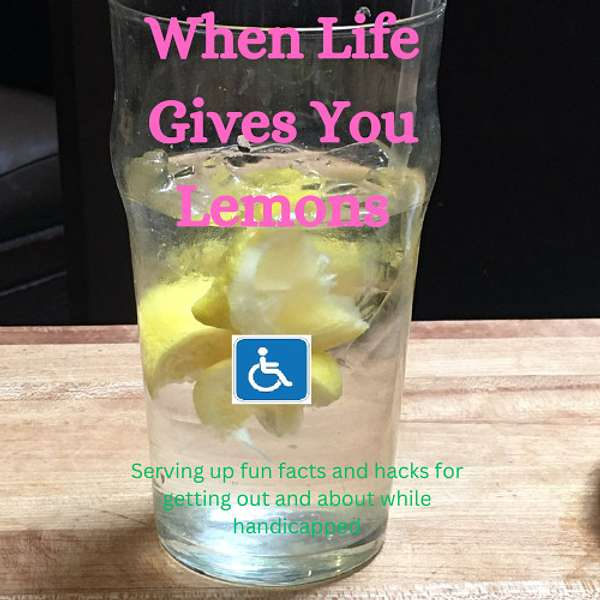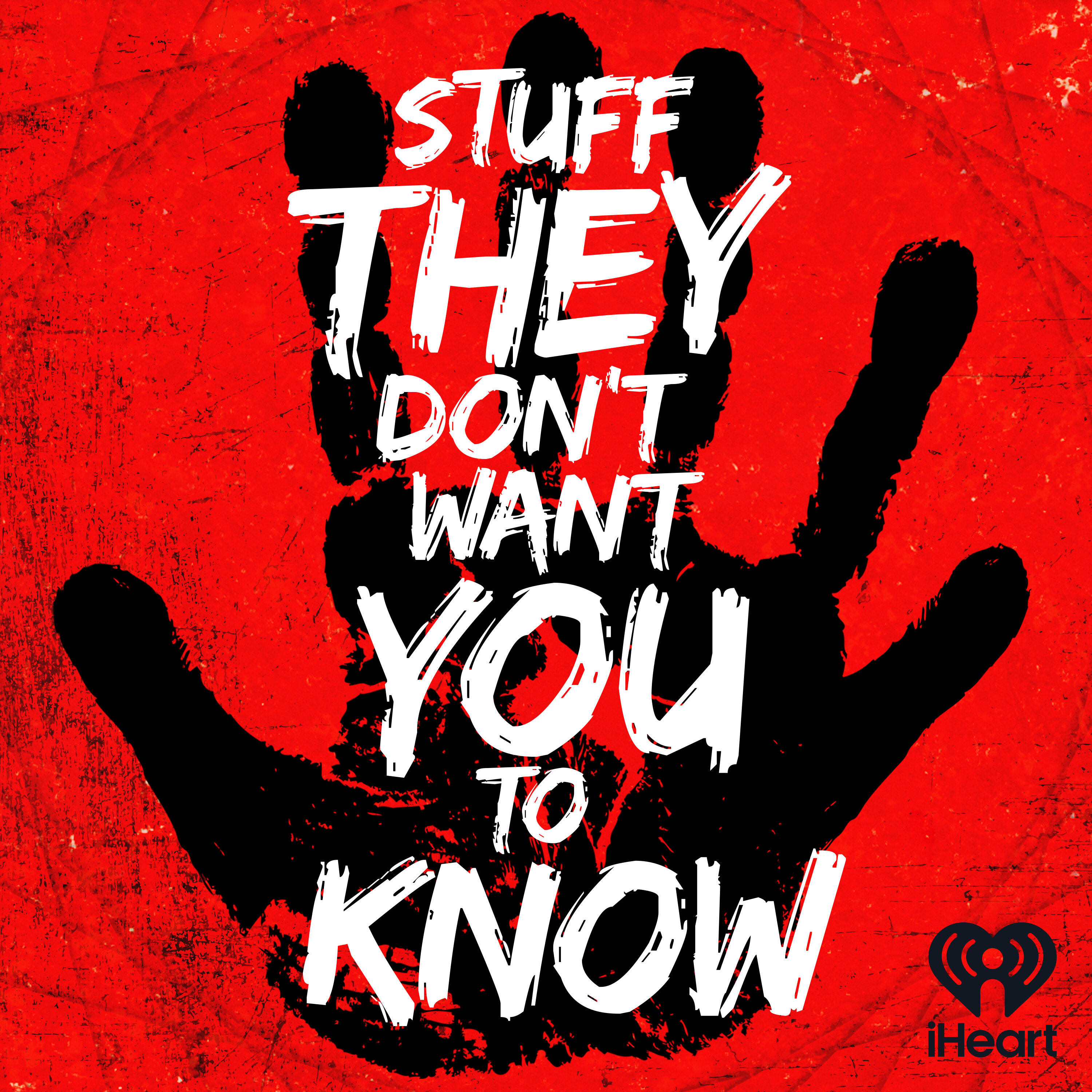
When Life Gives You Lemons
We do a bit of Research into handicapped travel issues and provide some solutions. Mobility, Hearing, Sight, Mental issues included. so far our episodes have included some information on Ataxia, Cerebral Palsy, Deafness, Dancing Sickness, Gulf War Syndrome, Long Covid and Wheelchairs. We are both Disability Advocates and realize there are too many diseases and conditions to cover and try to discuss the most common problems disabled people face and spread some awareness of disabled issues non-disabled people are unaware of.
CORRECTION
On a Previous episode I described how to enter our End Of Season contest. Step 1 click on the support our show link. Step 1 we require a one time payment (This has changed during our season) of $3. Step 3 (get you back to a one time payment) click on the $3 Subscription button. The following business day cancel the subscription (if you do it same day your bank may start thinking FRAUD. Step 4 Your done. Thanks for entering and "may the odds be forever in your favor",
When Life Gives You Lemons
Understanding ALS: Symptoms, Risks, And Care
Motor neurons are the body’s messengers, and when they fail, everyday actions start to slip. We take you inside ALS with a clear, human guide to what’s happening in the body, how early signs can be mistaken for stress or overuse, and why diagnosis relies on careful testing rather than a single lab result. From muscle twitches and speech changes to breathing challenges, we map the path of progression and spotlight practical ways to protect function.
We talk frankly about risk: age bands where ALS is more common, why men face higher risk before 65, and how smoking, toxins, and repeated head or spinal trauma can stack the odds. Genetics play a role in a minority of cases, with known variants like SOD1, but most diagnoses are sporadic. That makes smart prevention strategies feel more like risk management: avoid harmful exposures, keep your body strong, and nourish your nervous system with an antioxidant-rich diet that supports overall brain health.
Care focuses on quality of life. We share how physical, occupational, and speech therapy extend independence; why gentle, consistent movement helps; and where assistive devices and respiratory support make a real difference. Public figures—from Lou Gehrig to Stephen Hawking—offer lessons in awareness and longevity, while newly diagnosed celebrities remind us how subtle the first clues can be. For those hungry to learn more or get involved, we point to trusted resources like ALS.net, the ALS Association, and university registries connecting patients to biomarker studies and clinical trials.
If this conversation gives you clarity or comfort, share it with someone who might need it. Subscribe for more thoughtful, accessible takes on disability and health, and leave a review to help others find the show.
Sounds right on a podcast when life gets you the limits. I'm Kevin.
Palmi:And I'm Palmi. We consider ourselves disability advocates and intend to spotlight some disability issues and things we find interesting that we frequently encounter when we're out and about. Also some history on disability that we find interesting.
Kevin:Hello everybody, and welcome to our podcast when life gives you limits. I'm Kevin.
Palmi:I'm Palmy.
Kevin:And this week we're going to talk for a little bit about Amiotropic Lateral Sclerosis, otherwise known as ALS, otherwise known as Luo Gerig's disease. Okay. Weren't you going to talk a little bit about famous people having ALS?
Palmi:Let's do that at the end.
Kevin:Okay.
Palmi:What does ALS do, Kevin?
Kevin:ALS damages motor neurons, which are essential for muscle development. In other words, it uh affects your ability for your brain to uh talk to the muscles, if you will. Which weakens the muscles and eventually causes um I think they say later on that ALS typically ends in respiratory failure.
Palmi:Right. Well that's basically what they said.
Kevin:A matter of just the e muscles you use to breathe getting weaker and weaker in your body to breathe getting less and less.
Palmi:Leads to uh loss of mobility, speech difficulties, and trouble speak uh swallowing and difficulty breathing as the ultimate end of your life. Uh the early symptoms are muscle twitching, weakness in the limbs, slurring of speech, difficulty speaking, and swallowing. Um, and all of this is very similar to some of your u symptoms that you had.
Kevin:Which is also similar to early signs of Parkinson's and early signs of multiple sclerosis.
Palmi:So anything that has to do with the um neurons or isi very hard to figure out.
Kevin:Being dealing with the brain usually involves both testing and accommodation of testing and uh observation by trained neurologists.
Palmi:The progression is muscle cramps, stiffness, fatigue, emotional changes like inappropriate laughing or crying, cognitive decline in some cases, the later stages is pro um being paralyzed, and uh respiratorial failures. There is the cause of this is really unknown, right?
Kevin:Yeah, unfortunately it is genetic.
Palmi:Of only about 10%.
Kevin:Yeah, it can be genetic. Yeah, but it's not like here is the gene that causes ELS. It's more like if you have a couple of genetic markers, what they call genetic markers, you're of high probability of catching ALS.
Palmi:Not catching, but uh but having ELS at some point. It's often linked to um to mutations in genes like the SOD1, and then there's several others that are the risk factors. Um, the most common age of symptoms occurring is between 55 and 75. Male males have a higher risk um before the age of 65. Smoking increases your risk, exposure to environmental toxins also increase your risk, and military services, possibly due to traumatic or uh chemical exposures.
Kevin:See, that's our problem. They uh named this disease partially after Lou Gehrig, right? Right. What else do you do this way, Miss?
Palmi:I don't know where you're going.
Kevin:He married Marilyn Monroe.
Palmi:I don't think that's the same one. o
Kevin:They didn't stay married, they're only married for a few years and they divorced.
Palmi:Oh, okay.
Kevin:But if you know granted Marilyn didn't have ALS, but had it been a female not predominantly male affecting males, if they're a celebrity like Marilyn Monroe, they could have uh associated with this disease, they could have uh raised a lot more money for research on thinking.
Palmi:Well, I think he was pretty famous.
Kevin:He was, but as with all athletes, when the young retiring get out of the limelight, they tend to be forgotten easily.
Palmi:Uh the problem with finding um out whether you have ALS is that there is no single test that just like kind of like the uh Taxia that you have, um, there is no single test that confirms ALS. It's a a combination of diagnoses involving uh neurological exams, um EMG EMGs, uh nerve conduction studies, MRIs, blood and urine tests to rule out any other conditions. And there is no cure. No treatment is aimed uh to slow the progression or improve all so your treatment is just to slow progression or try to improve the quality of life of the patient. Some of the medication is to to is specific to a genetic uh help with the genetic mutation. But there's like therapy, physical, occupational, and speech therapy. There's nutritional, there is thought that nutritional counseling and breathing aids and it uh uh assistant devices will help you with the symptoms.
Kevin:Yeah, I think it's very important uh physical therapy-wise with this particular disease, since you're trying to delay the weakening of muscles. So it's important they keep exercising.
Palmi:Right. That's what you were told all along is uh use or lose it. So I think that probably portrays to this also. Um the average lifespan um after diagnosis is three to five years. Um, about 10 to 20 percent live 10 years or longer. And I read uh another article, and they said a lot of it's based on your BMI, um, your body to fat ratio. Um if you have a lower BMI, chances are that it will increase your lifespan.
Kevin:Yeah, for those that are not involved with uh tracking your weight, like POM B as BMI stands or body mass index, just a basic breakdown of height versus weight. Height versus weight, uh what's muscle, what's not, yeah, it's et cetera.
Palmi:It's yeah, it's just if you're more fit, you it makes sense. If you're fit more fit, then you'll be have a longer lifespan. Um, the most common cause of death is respiratorial failure. Um preventing ALS. What we know so far is that it's a the condition is currently no known cure, no no positive uh method of prevention. So researchers are trying to identify several strategies that may help reduce risk or delay onset, especially in individuals with a genetic pre disability. Disposition, yeah, that's the word. Um genetic and environmental risk management. Um the genetic you can take genetic screening for your family to see if you have a history of ALS and genetic and try to identify the uh mutations on your gene on if you have those gen uh mutations in your gene pattern. Avoid being, you know, common sense, avoid pesticides, heavy metals.
Kevin:For those of you that don't know what heavy metals are, a couple examples are lead or uh manganese. But that's not the entire list, that's just a couple examples.
Palmi:Trying to reduce physical trauma by you know not being um repeative concussions, spinal injuries that are linked to higher ALS risk. Wearing helmets, avoiding high risk high impact activities may also help. Avoid smoking. That's probably the easiest one. Um it's known to have environmental risk factors for ALS. Um nutritional and lifestyle factors. Kind of what we've always heard is uh eat your vegetables, um, leafy greens, spinach, kale, broccoli may help uh reduce neo inflammation inflammation and oxidation stress, which is implemented in ALS progression. Um, while there is no direct link between diet and ALS onset, maintaining a balanced diet and avoiding processed foods and toxins may support overall neuro neurological health. So it's just basic health being healthy. Again, BMI. Search and merging strategies are biomarker tracking. Studies have are undergoing to identify early biological changes that precede, progress into ALS symptoms.
Kevin:And that would uh potentially enable people to uh spot ELS before those symptoms occur that we talked about, which are common symptoms, correct? Right.
Palmi:So let's there's a whole bunch of other stuff. Um there is a bunch of studies that are um drugs worthwhile drug studies that are out there. If you're interested in it, all you have to do is um research it. But let's talk more recently. There's been quite a few um very public people that have announced or that we've then or that we've found out that they've been uh diagnosed with ALS. Uh the probably the most f I mean most famous is the ball player that you just mentioned, Lou Gehrick. Lou Garrick. Yeah. And then uh Stephen Hawking's is also uh physic phys physicist that was diagnosed with ALS. He's since passed.
Kevin:Roberta Flacca.
Palmi:Yeah. Eric Danes, Eric Dane, and Stephen Gleason, Steve uh Stephen Hillenberg, which is the creator of the animated series um Sun SpongeBob SquarePants.
Kevin:So let's just take about the astronaut, Sam Shepherd.
Palmi:Oh yeah. No, I don't think that's the actor. There's an actor that played.
Kevin:I think he did play an astronaut, but no, Sam Shepard was an astronaut.
Palmi:Oh, was he too? That was the actor.
Kevin:Well uh I think he was involved in the uh Paul 13 moon mission.
Palmi:But he's not the one that has the actor was the one that had the airs. Yeah.
Kevin:Couldn't tell you. Yeah. And like you say, um just reading.
Palmi:So Stephen Hawking's was born January 8th, 1942, um, in Oxford, uh, England, and he died March 17th, uh March um 14th, 1918. Um 2018, sorry. He contributed um to our understanding of the universe. He worked on the black hole in the Big Bang Theory. He was also known for his theory that the black hole emitted par particles.
Kevin:Apparently, also he uh had something to do with time travel.
Palmi:Why?
Kevin:Because he was born before he died.
Palmi:January 8th, 1942, and he died 2018.
Kevin:Yes, but you said the first 1918.
Palmi:Oh, sorry.
Kevin:Just to joke.
Palmi:His cause of death was Lou Garrick's disease. He became paralyzed, and he's famous for being in the you seeing him in the wheelchair. He was diagnosed at the age of 21. His disease progressed slowly, and he was expected to live only a few years after his diagnosis, and he continued working uh for decades and became a wheelchair user as far because of his paralysis. He lived to be 72, so he was diagnosed when he was 21, and he lived until he was 76.
Kevin:Yeah, I wish you were around that we could ask what he attributes that abnormal longevity to. I did he pay special attention to his physical therapy or specific physical therapies or what have you.
Palmi:Yeah, it doesn't say that.
Kevin:Uh it's not, you know, with him not being around, you can't find that answer. You can only find what people think of you know, opinions.
Palmi:Roberta Flack was uh born February 10th, 1937, and she died February 24th, so recently 2025. She was diagnosed. She was, of course, a musician. It doesn't say when she was diagnosed. I think she was most famous for uh Killing Me Softly.
Kevin:Oh, yeah. I remember that song.
Palmi:Yeah. That's what I remember her by. Uh most recently, Eric Dane is an actor. Um he was he's 52 years old. He was diagnosed just recently. He was he's been in um Gideon's Crossing and also on Charmed. He's best known for his at role on Dr. Mark Sloan on the uh ABC medical drama Grey's Anatomy. He's Mr. He's Dr. McDreamy, if you watch that show. And he was just mostly uh recently diagnosed this year. He said one of his uh the his symptoms that his initial symptoms included weakness in his right hand, which he initially thought was just fatigue from texting. Other symptoms that he was experiencing that are common with ATLS include muscle twitching and cramps, slurred speech and difficulty swallowing, and trouble with daily activity like walking. Uh, he initially dismissed the symptoms until it got worse, and then he went to a specialist, a multi-hand specialist, and then a neurologist. And after nine months of appointments, he was diagnosed with ALS.
Kevin:Yeah, folks who wanted the neuromuscular disease problems you've got is they're so close together that it requires both testing and observation by your physician or neurologist. And so what that means is there's usually a period where well everybody is certainly uh something, they're just not sure exactly what it is. And then once you they finished that period of their testing and observation, sometimes you can narrow it down even further with some genetic testing if you can afford it.
Palmi:Um they he was uh it was suggested to him that he managed his nutrition and and it that it's nowadays it's vital that and they've researched that a ri a diet rich in antioxidants and anti-inflammatory compounds would be beneficial to him. And he used the Cleveland Clinic, is where he went went and got all that information. So Stephen Hawking is the long the person that has lived the longest with ALS, and that was 55 years. They don't know why he lived that long, they don't know what he did to live live that long. Like Kevin was saying, he he contributed his longevity to aggressive respiratory support and maintaining an active lifestyle, is what he says. ALS is typically not a painful disease, but complications can cause pain. Progressively, muscle weakness and twitches, twitching can cause muscle cramps and stiffness and strain from and from weak muscles affecting posture and leading to discomfort. Also, pressure sores because of the way you're laying, constipation, uh, changes in diet and hydration due to swallowing difficulties can lead to constipation, which can be painful according to the target ALS. What is not a symptom of H ALS is pain, numbness, or loss of feeling, uh, impaired automatic function, like heart rate or gut movement. So doctors say it's a weakness, not a pain. Um, by marriage, uh had ALS. My Uncle Bill was just here recently tr uh visiting with us, and um sh he was telling me that um she lived three years um after she was diagnosed, and it was rare that a woman would have it, but she ha experienced all the all of those symptoms and eventually passed away due to respiration. She just quit breathing.
Kevin:It also says that based upon your uh neck markers they've had different drug trials that showed up to a fifty percent disease progression over all the results. So in other words, during their trials, which are not completed yet, they're still on the yearly stages. They estimate that they have a 50% reduction in disease prevention, which is I guess good news if you have ALS. Okay, what you can do to uh explore a bit more or view okay. I'm going to uh there are two different topics here. Learn a little bit more. Obviously, uh there's a lot written on the internet about ALS. Um and I guess the main site is als.net and that'll give you the most up-to-date information. Uh Sanford University runs a uh database of people with uh well, it used to be rare diseases, but I don't think it's necessarily rare anymore. So for example, if you've had illness and you're at a certain point, they may want you for a clinical trial about uh some of the ongoing treatments. I don't think they're necessarily all confided to rare diseases, and those can range from actually going to uh a clinic or a hospital to uh conduct a a uh say a drug trial where it can be as little as your fellow the survey will email you a copy. It's not always as invasive as packing your bags and going to a university somewhere.
Palmi:And there is a ALS association that you can get more information from too. So I think that covers it. We definitely have learned some stuff about ALS, and there is probably more stuff to learn. I'm hoping that maybe we can find somebody to that we can um have a conversation with that either had a relative or knows a little bit more on a personal level.
Kevin:I I would like that very much. I personally don't know anyone with ALS, though.
Palmi:Yeah, I don't either. No, no, I mean my we asked my uncle Bill, and he was not interested in doing the podcast, so no.
Kevin:He doesn't have ALS though, does he? No, I mean he he my Aunt Shirley macular degeneration.
Palmi:Yeah, but I asked him about the ALS for my Aunt Shirley, and he didn't want to do that one either, so okay.
Kevin:Do we have any we have a little bit of housekeeping? This is the end of October, and uh this will be the last podcast for October. The next one will be our last podcast for this season. So if you're interested in uh joining the sweepstakes for end of season giveaway, which is a piece of art that we will ship to you. Uh you need to get on our website www.whenlife dot net and support our program financially. We're looking for a one-time minimum donation. Every time anyone uses fan mail, we'll give them a free shout out. But just be warned, sometimes people who reside outside the US are not eligible to use fan mail for free. Uh taxing charges may apply. So if that's the case, you can always email from me. Let me know that you would have used fan mail, but that was gonna be a cost to you. And I'll give you a shout out and we'll make sure that we look at that just like a fan mail type situation. So that about does it for this week. Remember, our next podcast will be our last one. That will be on the 5th of November. And uh, we're gonna start back up in February. So until next time, folks, see you later.
Palmi:Bye now.
Kevin:I'm sorry, folks, I misspoke earlier. Lugarri did not marry Marilyn Monroe, he married Eleanor Grace Twitch Lugarrick, who is um basically hit the love of his life and supported him through all those ALS struggles.
Palmi:And she was instrumental in getting the ALS named after him. And she s uh started the ALS group up after he had passed.
Kevin:I was going by a movie and not the facts. I'm sorry about that.
Palmi:Live and learn.
Kevin:Till next episode, take those love minutes and make your own love and date.
Podcasts we love
Check out these other fine podcasts recommended by us, not an algorithm.

When Life Gives You Lemons
Kevin & Palmi Henry
Stuff They Don't Want You To Know
iHeartPodcasts
Stuff Mom Never Told You
iHeartPodcasts
Stuff You Missed in History Class
iHeartPodcasts
Planet Money
NPR
Ridiculous History
iHeartPodcasts
The Way I Heard It with Mike Rowe
The Way I Heard It with Mike Rowe




